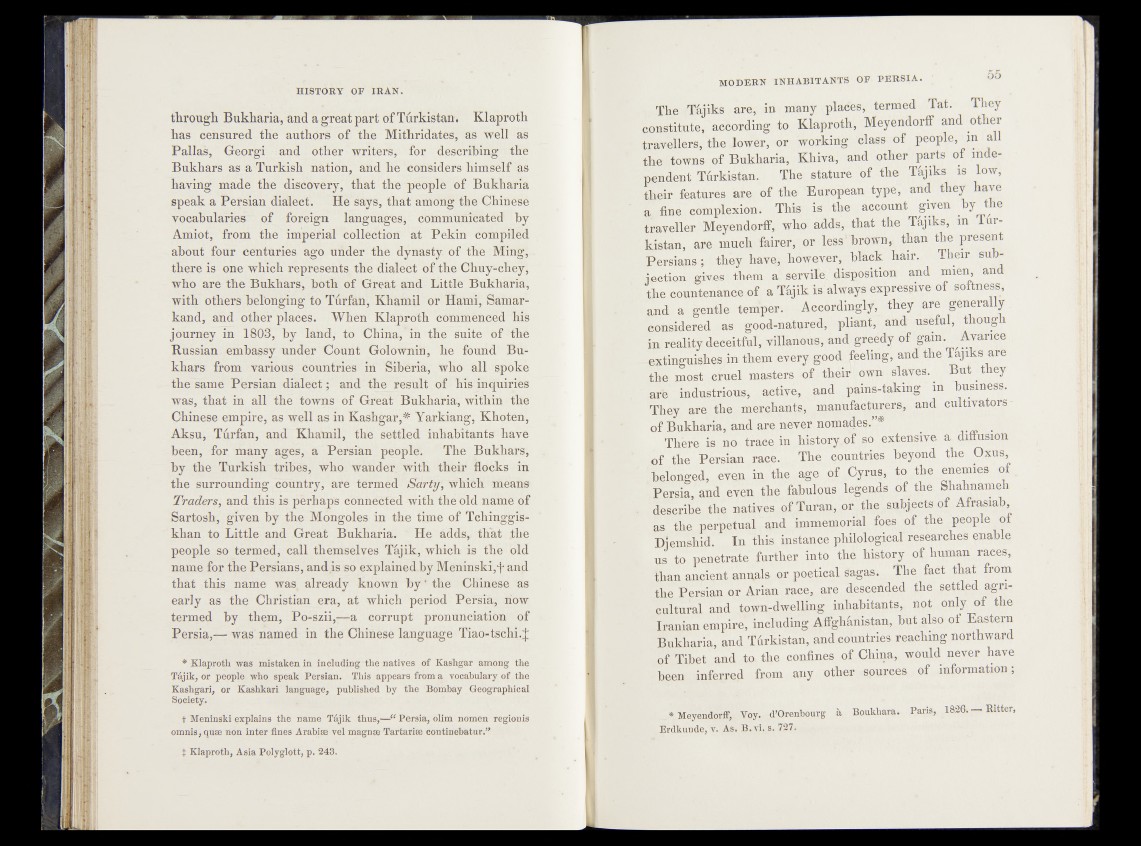
HISTÖRY OF IRAN.
through Bukharia, and a great part of Turkistan . Klaproth
has censured the authors of the Mithridates, as well as
Pallas, Georgi and other writers, for describing the
Bukhars as a Turkish nation, and he considers himself as
having made the discovery, that the people of Bukharia
speak a Persian dialect. He says, that among the Chinese
vocabularies of foreign languages, communicated !hy
Amiot, from the imperial collection at Pekin compiled
about four centuries ago under the dynasty, of the Ming,.,
there is one which represents the dialect of the Chuy-chey5,
who are the Bukhars, both of Great and Little Bukharia,
with others belonging to Turfan, Khamil or Harni, Samarkand,
and other places. When Klaproth commenced his
journey in 1803, by land, to China, in the suite of the
Russian embassy under Count Golownin, he found BuV
khars from various countries in Siberia, who all spoke
the same Persian dialect; and the result of fife inquiries
was, that in all the towns of Great Bukharia, within the
Chinese empire, as well as in Kashgar,* Yarkiang, Khoten,
Aksu, Turfan, and Khamil, the settled inhabitants have
been, for many ages, a Persian people The Bukhars,
by the Turkish tribes, who wander, with their flocks in
the surrounding country, are termed Sarty\ which means
Traders, and this is perhaps connected with the old name of
Sartosh, given by the Mongoles in the time of Tchinggis-
khan to Little and Great Bukharia. He adds*. that Jb e
people so termed, call themselves Tajik, which is the old
name for the Persians, and is so explained.by Meninski,f anji
that this name wast already known by* the -Chinese as
early as the Christian era, at which period Persia, now
termed by them, Po-szii,—a corrupt pronunciation of
Persia,— was named in the Chinese language Tiao-tschi. J
* Klaproth was mistaken in includingthe natives of Kashgar among the
Tajik, or people who speak Persian. This appears from a vocabulary of the
Kashgari, or Kashkari language, published by the Bombay Geographical
Society^
t Meninski explains the name T&jik thus,-—“ Persia, olim nomen regionis
omnis, quae non inter fines Arabise vel magnse Tartarise continebatur.”
t Klaproth, Asia Polyglott, p. 243.
. The Tajiks are, in many places, termed Tat. They
constitute, according to Klaproth-, Meyendorff and other
travellers*, the Jower, or working class of people, in all
the towns of Bukharia, Khiva, and .other parts of independent
Turkistan. The stature of the Thjiks is low,
their..features are4 of the European type, and they have
a fine complexion. This|i%4he account given by the
traveller Meyendorff, who add^that the Tajiks, m Thr-
kistan, are much fairer, or less'hrown,- than the present
Persians ; * they ha v<% however, black hair. Their- subjection
gives them a servile,' .disposition and mien, and
the countenance of a Tajik is always^expresgive of softness,
• and a gentle temper. Accordingly, they- are generally
considered as good-natured, pliant, and us^fdl, though
"in reality ^eceitfnl, villanodsr, andfgtfeeft5'0/ ^ ain* /^ varice
-extinguishes.in them'eyery goodTeeting, and'th’e-Tajiks are
f i e ’most cruel masters-of > their'*'own slaves. „{-But they
' afe industrious, a c tiv | and pains-taking "in business.
They are the ^mer^mn|s, manufa<||irers,, an^cultivators -
% Bukharia, and are never nomades^*
,\jThCra S J n o ’ tr ic e in history^of | a diftusion
o f the Persian race. The" countries beyond f f i e ^ x p s ,
b e lo n g e d , ev$n in the age o f C y ru s,'to th e enem ies,.-o f,
Persia , ajrd even th e fabulous legends o f;Jhe Shahnameli
describe-the n a t i v e ^ f Turan, or the s u j j ^ f i g Afrasiab,
as the perpetual “apd immemorial, fo e s mf the p e o p le ^
D iem s h id In this, instance p h i l o ^ ^ a l rese,arehes enable
ms i o penetrate further into the |is to r y o f hipnan r^qes^
than ancient annals(V poetical Sagas., The fact tha t from
the Persian or Arian race, are. descended t h ^ t t l ^ d agricultural
and townrdw e llin g inhabitants^ p^t; onJy; o f th e
Iranian empire* including ,Affgh.|nistan, but also ot Eastern
Bukharia, and Tdrkistan, and.pduhtries.reaehing.northward
o f Tibet and to. the confines o f Chi^a, would never have
been inferred from any other sources ,, o f information;
* Meyendorff, V'oy.. /Fprenbourg h Boukbara. Paris, 1 8 2 6 .^ Ritter,
Erdkunde, v. As. B.vi. s. 727.